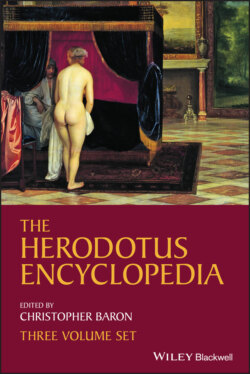Читать книгу The Herodotus Encyclopedia - Группа авторов - Страница 925
BACCHUS, see DIONYSUS BACIS (Βάκις, ὁ)
ОглавлениеMARGARET FOSTER
Indiana University
Legendary figure credited with a well‐known collection of hexametric ORACLES. Herodotus mentions oracles of Bacis four times in the Histories, all within the context of key battles of the PERSIAN WARS. In three of these references (8.20.2; 8.77.1–2; 9.43.2), Herodotus quotes the oracles verbatim. Following the Battle of ARTEMISIUM, the EUBOEANS neglected to heed an oracle of Bacis and suffered destruction as a result (8.20.2). Herodotus also relates an oracle of Bacis that anticipates the Greeks’ victory at SALAMIS (8.77.1–2). Herodotus uses this as EVIDENCE of the truthfulness of clear oracles, asserting his unwavering belief in such oracles and his refusal to refute them. (Some modern editors suggest that this chapter is a later interpolation and/or not written by Herodotus: see Wilson 2015, 161). In two further passages, Herodotus connects Bacis to another legendary figure associated with an oracle collection, MUSAEUS. Unlike those of Bacis, however, Musaeus’ oracles are never quoted. Following the Battle of Salamis, Herodotus reports that every oracle was fulfilled, including those of Bacis and Musaeus (8.96.1–2). A final oracle of Bacis, which Herodotus notes was similar to an oracle of Musaeus, predicts the Greeks’ victory over the Persians at PLATAEA (9.43.2). ARISTOPHANES repeatedly lampoons Bacis, whom he seems to deploy as the archetypal chrēsmologos (“oracle‐monger”) (e.g., Ar. Eq. 123–24, 1004; Av. 962). According to the Suda, PEISISTRATUS’ nickname was Bacis (Suda s.v. Βάκις (B 47); schol. Ar. Pax 1071). Although Herodotus only refers to a single Bacis, multiple Bacides are reported by later ancient authors (Ael. VH 12.35).
SEE ALSO: Eleon; Prophecy; Religion, Herodotus’ views on
